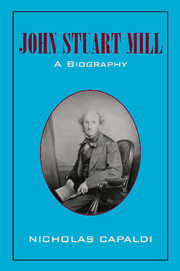Book contents
- Frontmatter
- Contents
- Preface
- Acknowledgments
- 1 Childhood and Early Education: The Great Experiment (1806–1820)
- 2 Company Man and Youthful Propagandist (1821–1826)
- 3 Crisis (1826–1830)
- 4 The Discovery of Romance and Romanticism (1830–1840)
- 5 The Transitional Essays
- 6 Intellectual Success (1840–1845)
- 7 Worldly Success (1846–1850)
- 8 Private Years (1850–1859)
- 9 The Memorial Essays
- 10 Public Intellectual (1859–1869)
- 11 Last Years (1869–1873)
- Notes
- Bibliography
- Index
3 - Crisis (1826–1830)
Published online by Cambridge University Press: 17 July 2009
- Frontmatter
- Contents
- Preface
- Acknowledgments
- 1 Childhood and Early Education: The Great Experiment (1806–1820)
- 2 Company Man and Youthful Propagandist (1821–1826)
- 3 Crisis (1826–1830)
- 4 The Discovery of Romance and Romanticism (1830–1840)
- 5 The Transitional Essays
- 6 Intellectual Success (1840–1845)
- 7 Worldly Success (1846–1850)
- 8 Private Years (1850–1859)
- 9 The Memorial Essays
- 10 Public Intellectual (1859–1869)
- 11 Last Years (1869–1873)
- Notes
- Bibliography
- Index
Summary
In 1826, Mill experienced the great crisis of his life. This crisis had two interrelated dimensions, a personal-psychological one and an intellectual one. The personal crisis was the need to become independent of his father; the intellectual crisis was the growing awareness of the inadequacies of philosophic radicalism even in its most coherent form, namely that of his father. Needless to say, Mill does not in his Autobiography directly confront the psychological crisis; rather, he discusses at great length his intellectual disenchantment with radicalism. There are two important reasons for this. First, the intellectual crisis, although real enough, became the surrogate forum in which he asserted and achieved independence from his father's thought. Second, the psychological crisis, as we shall see, was never honestly and directly resolved during James Mill's lifetime. Mill chose to live a double life. In all outward respects he was loyal to his father's wishes and views, but he harbored a secret intellectual life in which he asserted his independence. Mill genuinely admired and respected his father more than any other man, appreciated and shared what James Mill was trying to do in the larger cultural arena, and remained grateful for the independence of intellect that his father had cultivated in him. But he inevitably resented the paternal demand that personal loyalty required him to pay lip service to views that he did not really share. Perhaps Mill was ashamed that during his father's lifetime he lacked the courage to confront directly their differences.
Information
- Type
- Chapter
- Information
- John Stuart MillA Biography, pp. 55 - 85Publisher: Cambridge University PressPrint publication year: 2004
